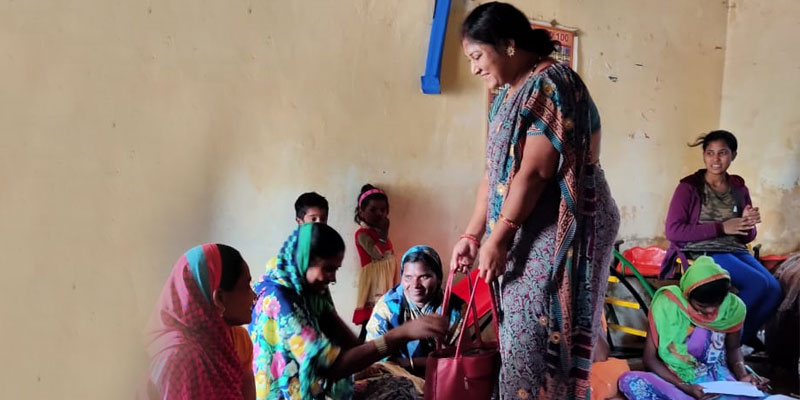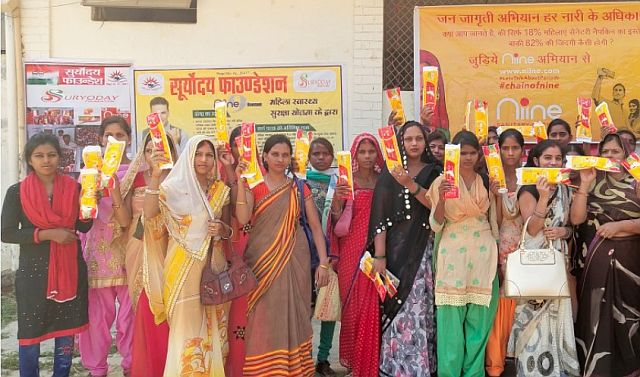Why is a natural bodily process a topic of shame for women and teenage girls? Access to sanitary care products was hard; the COVID-19 pandemic has made it all the more difficult, especially for Indian women in the villages. Menstruation is a taboo word and various rituals demonising the natural female process culturally bind women, negating their positive contributions and ostracising them. A number of menstrual hygiene CSR initiatives are addressing this.
According to estimates and surveys gleaned on Menstrual Hygiene Day, of the nearly 36 crore menstruating women in India, only 6 to 7 crore have access to sanitary pads. 71% of them have no knowledge of menstruation before their first blood and 82% use alternatives such as rags, old cloth, hay, sand or ash. About 6.30 crore adolescent girls live in houses without toilet facilities, and 88% adolescent girls are unaware of the health implications that could occur due to poor menstrual hygiene.
It is the total lack of hygiene during menstruation due to unavailability of sanitary napkins or clean towels and cloth that is a matter of concern. Girls drop out of school once they start having their periods. Leaves, mud, ash, dirty cloth used for sanitary purposes lead to urinary tract infections, fever and anaemia. These menstrual hygiene CSR initiatives create awareness, destigmatise the monthly phenomenon and, in some cases, generate employment.
Procter & Gamble’s Mobileshaala
Considering its the parent company for popular sanitary care brand Whisper, it seems like a natural fit for Procter & Gamble to invest in CSR programmes for MHM (menstrual hygiene management). Whisper began the journey to normalize menstruation in India 3 decades back; it was the first brand to show a sanitary pad, and the first to mention the word ‘periods’ in advertising.
School closures due to the ongoing pandemic could lead to increased drop-out rates, disproportionately affecting adolescent girls. While closing down schools temporarily might help contain the virus, it could have a permanent effect on the future of many – especially marginalised girls, who are now even more vulnerable to dropping out of school in the absence of structured education. Uninterrupted learning is of utmost importance for these girls.
Moving forward with their #KeepGirlsInSchool movement, Whisper launched ‘Mobileshaala’ in May 2020, an initiative to provide free education while schools across the country remain closed. It is a phone-based learning system that gives free access to curriculum-based education modules on key subjects like English, Science and menstrual hygiene education.

It is startling that when girls hit puberty, one out of five girls starts missing school, leading to her eventually dropping out and we do not even notice. To bridge this gap, Whisper initiated the #KeepGirlsInSchool movement earlier this year to empower girls with menstrual hygiene education and as a major step towards achieving the brand’s vision of 100% menstrual hygiene in India. The first phase of #KeepGirlsInSchool initiative has helped keep 50 lakh girls in school.
P&G is renowned for taking menstrual taboos head-on. Back in 2014, Whisper’s widely acclaimed award-winning #TouchThePickle, was one of the first campaigns where any brand or institution in India, took on the taboos surrounding periods at a mass scale. The campaign not only sparked conversations on period taboos but also drove acceptance of this conversation among the older generation which is supposedly the most immersed in these deep-rooted traditions and taboos. Since then, the brand has come up with many campaigns such as #LikeAGirl, #SitImproper, #MeriLifeMereRules, that break societal taboos on periods.
Whisper has pledged to reach five crore girls across India with its ‘Mother Daughter Menstrual Health and Hygiene Programme’ by the end of 2022. The pledge was made at the ‘Need to Break Silence and Build Awareness’ event by ASSOCHAM in 2019. As a part of this pledge, Whisper will now be reaching out to more than 40,000 schools to increase awareness about menstrual hygiene. The brand claims to have already educated over 2.5 crore girls about menstrual hygiene since its inception in 1995.
Tata Water Mission initiative
The Tata Water Mission promotes safe and effective menstrual hygiene management in around 900 villages, covering a stakeholder base of over 200,000 women and 45,000 men of all ages over a period of three years. The programme seeks to build a socio-cultural environment that is conducive for girls and women to manage menstruation with dignity and without any fear.
The initiative began with the mapping of existing knowledge, attitude and practices within target communities. It tapped local implementation partners and self-help group networks to disseminate the Behaviour Change Communication (BCC) at the school and community level. Sensitisation workshops and training of frontline health and sanitation workers have helped achieve demonstration and scale.

Under this programme, women are provided access to clean absorbents and a basket of related products for safe and hygienic management of menstruation. This is done through the encouragement and aggregation of a retail model, involving the identification, training and mentoring of retail entrepreneurs, and triggering consumer-led demand of such products.
Women are provided with safe and convenient facilities equipped with soap and water, offering privacy for changing absorbents. Facilities are also provided for the safe and effective disposal of waste products. Small-scale pilots on composting and incineration are also planned besides the exploration of a micro-entrepreneur model for collection, transportation and treatment of waste.
Phase I of the MHM programme covers the states of Uttar Pradesh, Karnataka, Rajasthan, Gujarat, Jharkhand, Uttarakhand and Maharashtra, while phase II will extend the programme to the states of Telangana, Odisha, Nagaland, Andhra Pradesh and Mizoram. Partnering with the Trust on this programme are the companies Livinguard Technologies Pvt Ltd, Eco Femme, Aakar Innovations, Uger, Boondh and Saral Designs.
Kent RO’s Kadam Sapno Ki Aur
On International Women’s Day in 2017, Sunita Gupta, Director, Kent RO Systems Limited, decided she was going to help women in far-flung villages. She broke the taboo around the subject of menstruation by speaking unhesitatingly about it to both, women and men.
Gradually inhibitions dropped as she took the lead to set up a unit run by women and supported by men for packing menstruation cloth and traditional underwear (langot) to women and girls among remote communities. The softest cotton material is procured and handstitched and packed at these units. The cloth pads thus created is reusable and washable and hygienic.
Members of Kent Foundation (the CSR arm of Kent RO Group) sat down on March 20 with women in the unit and made their first batch of handmade sanitary towels as a sign of commitment. The first recipient of 600 packs of 15 cloth pads was The Grameen Foundation, Jehanabad Bihar, whose Director Birender Sharma carried out the campaign with the help of volunteers from nonprofit YUVATI (Youth Under Voluntary Action for Transportation), which works in the field of girl child education.
Kent Foundation and Rotary International District 3011 signed an MoU for implementation of menstrual hygiene education and awareness programme – Kadam Sapno Ki Aur. The drive is likely to benefit over 1.20 lakhs women and girls in rural India. In an endeavour to educate and make women and adolescent girls aware of this issue, Kent Foundation has adopted a multipronged approach to educate and provide them sanitary napkins. The foundation has chosen three critical pathways:
(a) social mobilization, education & awareness;
(b) creating in house infrastructure to fulfill the demand of sanitary napkins and
(c) supplying these sanitary napkins free of cost to those section of society who have not any access and means to buy the sanitary napkins.
Niine Movement
The Niine Movement is an ambitious 5-year plan that began in 2018. It aims to tackle the taboos associated with menstruation by engaging all genders and ages to step forward and join hands to promote the importance of menstrual hygiene awareness.


